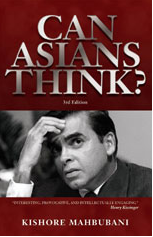
1 May, 2016
Can The Travel & Tourism Industry Think?
In 1998, Singaporean diplomat Kishore Mahbubani, Professor in the Practice of Public Policy and Dean of the Lee Kuan Yew School of Public Policy at the National University of Singapore, published a book called “Can Asians Think?”
 |
One review of the book says: “Asia’s economies are poised to surpass those of Europe and North America within the next fifty years, and yet Westerners have done little to adjust their attitudes in light of present-day realities. In order to avoid a “clash of civilizations,” Mahbubani believes that a great deal of self-reflection will be required by all concerned. His analysis of the past and his predictions for the future are a wake-up call to Asians and Westerners alike.”
Source: http://www.mahbubani.net/book1.html
Another review says: “A must-read for anyone with even a passing interest in contemporary Asia, this collection of provocative essays is certain to challenge the way you think. Asia’s societies were more culturally and economically advanced than Europe’s at the end of the first millennium. And yet by the nineteenth century the West had leaped so far ahead that even some Asians themselves harbored images of inferiority.”
Source: http://www.amazon.com/Asians-Think-Understanding-Divide-Between/dp/158642033X
Published right after the 1997 Asian economic crisis, this editor read that book with great interest. It did very much what I have long sought to do in travel journalism: Shake up the establishment and “challenge the way you think.”
Today, more than ever, that same question ought to be posed to the travel and tourism industry: Can it think?
Two central lessons I have learnt in nearly four decades of covering global travel and tourism: 1) An industry that sells dreams for a living has great difficulty living with nightmares and 2) It has no sense of history, and because it does not learn the lessons of history, it is prone to repeating them.
Indeed, travel & tourism excels in sweeping issues under the carpet and hoping the problems will go away.
|
The fallacy of this approach can be easily proved by citing the health & wellness segment, one of the T&T sector’s biggest growth areas.
Health & wellness travel is surging because people are falling sick in record numbers, usually for self-inflicted reasons. Once sickness strikes, it’s off to see a doctor.
But the doctor is only a guide. After conducting the tests and analysing the symptoms, he/she tells you what you need to hear rather than what you want to hear, and then prescribes the way out. Ultimately, the patient has to make the soul-searching decision on what to do next.
Today, the myriad of environmental, economic and geopolitical sicknesses and ailments confronting travel & tourism have been worsened by a whole range of new maladies, such as ethnocentricity, communal tensions, nationalism, racism and xenophobia. Many of them are created, aided and abetted by politicians in supposedly democratic societies.
Will these impact on tourism? You, the reader, decide.
Has the industry responded? You, the reader, decide.
I could easily cite another 20 sicknesses and ailments just off the top of my head that the industry pointedly refuses to recognise. This head-in-the-sand attitude is the same as refusing to recognise the early-warning signs of a potentially fatal illness.
Which brings me to the original question: Can the travel & tourism industry think?
Many public platforms exist, at which one would expect debate and discourse to thrive. Regrettably, in nearly all of them, intellectual stagnation is systemic and omnipresent.
Travel industry conferences, at the mercy of thin-skinned sponsors, stick to the same old hackneyed topics within their politically-correct comfort zones. Travel media, at the mercy of their thin-skinned advertisers, have degenerated into mere conduits for recycling nauseatingly boring press releases. Even universities studiously avoid debating and researching these deeper issues for reasons best known to themselves.
One oft-repeated refrain is that this is a resilient industry and always bounces back.
That’s like a doctor telling the patient: Never mind all these aches and pains, take two aspirin and call me in the morning. You will soon bounce back.
“Bouncing back” may be okay for ministers, public-sector bureaucrats, salaried employees and others whose jobs and incomes remain intact regardless of repeated crises. But for those at the grassroots, such as souvenir sellers, taxi-drivers, roadside vendors and others who get hurt IMMEDIATELY when a crisis strikes, “bouncing back” has a hollow ring to it.
If the first step towards solving a problem is to recognise that there is one, some compulsive arguments can be made to prove that the time for such recognition is nigh.
The most compulsive of these arguments is that a semi-comatose, non-thinking attitude contradicts what the travel & tourism industry flaunts as one of its core values.
This is the grandiose claim that today’s generation is merely a custodian of the planet, holding it in trust for future generations. If that is true, does it make sense to not even think about looming problems which, in fact, are being directly and solely created by this generation?
By refusing to think about them, or thinking about them only selectively within politically-correct comfort zones, this generation IS IN FACT making sure that the next will inherit them.
Does that really make us responsible “custodians” of this planet?
So, back to the future: Can the travel & tourism industry think? You, the reader, decide. And take the poll below.
=========
=========
Read my exclusive, unmatched reporting on Prof Mahbubani’s writings and lectures:
Asia’s reform trinity, shift gear now – by Kishore Mahbubani
Asia Challenged To Overcome “Mental Colonisation”
Prof Kishore Mahbubani’s Letter to Netanyahu: Time is No Longer on Israel’s Side



Liked this article? Share it!